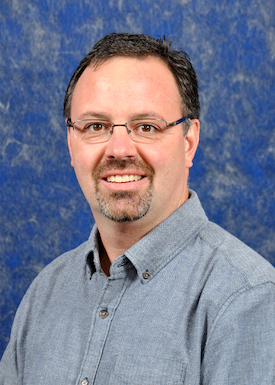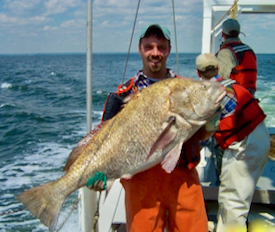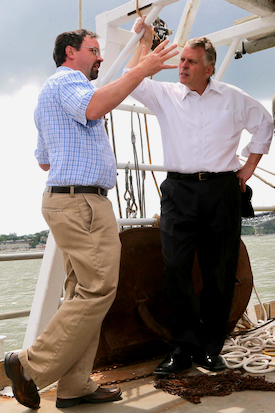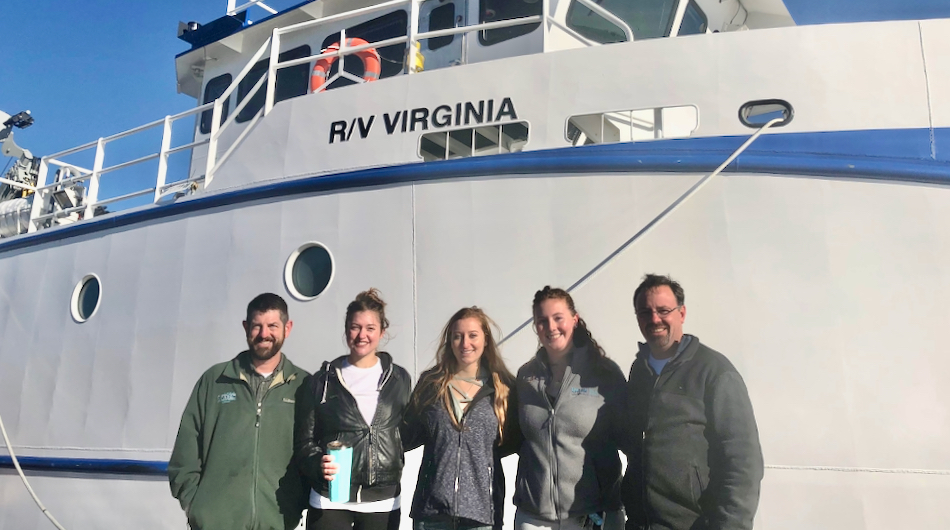Latour honored with Thomas Ashley Graves, Jr. Award
VIMS prof recognized for sustained excellence in teaching
Professor Rob Latour of William & Mary’s Virginia Institute of Marine Science was honored during commencement weekend with the Thomas Ashley Graves, Jr. Award for sustained excellence in teaching.
 Recipients of the award, named for the 23rd president of W&M, are selected annually by the president from nominations submitted by each of the academic deans. Also chosen was Judith Harris, Professor and Pavey Family Chair in Educational Technology at the W&M School of Education.
Recipients of the award, named for the 23rd president of W&M, are selected annually by the president from nominations submitted by each of the academic deans. Also chosen was Judith Harris, Professor and Pavey Family Chair in Educational Technology at the W&M School of Education.
"An exceptional professor"
Dr. John Wells, VIMS Dean & Director, says “It’s a most fitting honor for Rob to have been selected as a 2021 winner of the Graves Award. He has done a truly outstanding job of teaching and mentoring students in the School of Marine Science, and is well-known throughout VIMS as an exceptional professor.”
Latour, a faculty member in the Department of Fisheries Science at VIMS, is described by his award nominators as “an interdisciplinary scholar.” His scholarship and advisory service activities focus on collecting and analyzing the data needed to assess the health of commercial and recreational fisheries. He directs two ecosystem-level monitoring and assessment programs in Chesapeake Bay—one for finfish and one for sharks—and another in the coastal waters of the northeastern U.S. He also oversees a single-species program aimed at monitoring the population of striped bass in the Bay and mid-Atlantic, and previously ran a similar program focused on American shad.
 James Gartland, an Assistant Research Scientist who manages the day-to-day operation of these fisheries surveys, is also one of Latour’s current Ph.D. students. He notes that “Rob has an uncanny ability to distill complex ecological theory and associated mathematics into relatively simple concepts that are accessible to all his students.” Gartland, who earned a master’s in marine science from VIMS in 2002, credits Latour with encouraging him to pursue further studies and mentoring him along the way.
James Gartland, an Assistant Research Scientist who manages the day-to-day operation of these fisheries surveys, is also one of Latour’s current Ph.D. students. He notes that “Rob has an uncanny ability to distill complex ecological theory and associated mathematics into relatively simple concepts that are accessible to all his students.” Gartland, who earned a master’s in marine science from VIMS in 2002, credits Latour with encouraging him to pursue further studies and mentoring him along the way.
Another current Ph.D. student, Adena Schonfeld, says “Dr. Latour wants to provide us with the tools that will benefit us the most, so he doesn’t rely on lessons and labs that he used the previous year. Instead, he modifies them every time he teaches the class, so he can introduce the newest statistical techniques.”
"Intense but enjoyable" courses
Professor Linda Schaffner, VIMS’ Associate Dean of Academic Studies, says “Rob’s courses are known for being intense but enjoyable—he believes in challenging a student to push and grow intellectually through that process.” Latour regularly teaches Fisheries Population Dynamics and long taught Fundamentals of Statistical Methods and Data Analysis, the core course in statistics for the School of Marine Science. He has also taught Marine Fisheries Science and several special topics courses, including Modeling Biological and Ecological Systems. Latour has taught outside VIMS as well, including as a co-instructor for Tag Return Models for Fisheries Research, a workshop offered by the U.S. Fish and Wildlife Service.
 Dr. Mark Luckenbach, Professor and Associate Dean for Research & Advisory Service at VIMS, says “One of the reasons Rob’s students compete so successfully in the job market is that he immerses them not only in a cutting-edge research program, but actively mentors them in translating the results of their work to fisheries managers at state, regional, and national levels.”
Dr. Mark Luckenbach, Professor and Associate Dean for Research & Advisory Service at VIMS, says “One of the reasons Rob’s students compete so successfully in the job market is that he immerses them not only in a cutting-edge research program, but actively mentors them in translating the results of their work to fisheries managers at state, regional, and national levels.”
Dr. Mary Fabrizio, chair of Fisheries Science at VIMS, likewise emphasizes the relevance of Latour’s scholarship. “Rob’s research uses fish surveys as sampling platforms to collect biological, ecological, population-level, and community-level data for more than 30 harvested species in support of localized and broad-scale research questions,” she says. “The information from these surveys shapes policies for economically important fisheries, generates data for discovery and student training, and provides data for classroom instruction and student research aimed at tackling societal problems.” His contributions have led to 75 peer-reviewed journal articles and brought more than $27 million in external funding to the VIMS campus.
To date, Latour has advised or co-advised 9 Master’s and 11 doctoral students, including his 4 current students, and served on the graduate committees of 38 other students at VIMS and other institutions. He also participates in academic program governance and strategic planning at all levels.
When asked to describe his feelings on receiving the Graves award, Latour said, “I’m deeply honored to be recognized. Teaching and partnering with students in discovery have always been vital parts of my professional activities, and I’m incredibly grateful to the students because they push me to keep learning. Together we’ve tackled real-world fisheries problems, and I’m very proud of how our knowledge creation has aided societal needs.”
Previous awards
Latour has previously been recognized with the Outstanding Faculty Teaching Award from VIMS (2019), Excellence in Fisheries Education Award from the Tidewater Chapter of the American Fisheries Society (2016), Annual Award of Excellence from the Scientific-Technical-Advisory Committee of the Atlantic States Marine Fisheries Commission (2014), Outstanding Faculty Advisory Service Award from VIMS (2012),
and Plumeri Award for Faculty Excellence from William & Mary (2010).
Latour began his career at VIMS in 2000 with an appointment as a Postdoctoral Research Associate and advanced to a Research Assistant Professor in 2001. In 2004, he accepted a tenure-track Assistant Professor position in the Department of Fisheries Science; he was promoted to Associate Professor in 2008, awarded the Nunnally Term Professorship in 2008, and promoted to Professor in 2013.


